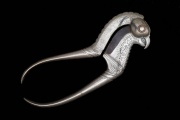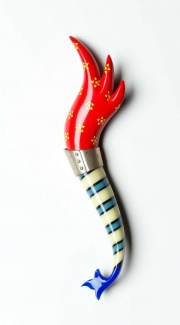Difference between revisions of "White metal"
m (Text replace - "== Authority ==" to "== Sources Checked for Data in Record ==") |
|||
| (One intermediate revision by one other user not shown) | |||
| Line 1: | Line 1: | ||
| − | [[File:2002.173-SC166222.jpg|thumb| | + | [[File:2002.173-SC166222.jpg|thumb|Betel nut cutter<br>MFA# 2002.173]] |
== Description == | == Description == | ||
| − | + | [[File:2006.95-SC187116.jpg|thumb|Acrylic brooch<br>MFA# 2006.95]] | |
| − | 1) A soft metal alloy containing over 50% [ | + | 1) A soft metal alloy containing over 50% [[tin|tin]]. White metal originally contained tin (92%) and [[antimony|antimony]] (8%), with small amounts of [[lead|lead]] or [[copper|copper]]. This mixture has a melting point of 246 C. The term is now used for any low melting alloy that contains tin with lead, or antimony. Examples are [[Babbitt%20metal|Babbitt metal]], [[pewter|pewter]], and [[Britannia%20metal|Britannia metal]]. White metal is used for bearings and in the casting of costume jewelry. |
2) Name for iron arsenosulfide commonly used prior to the 1800s when chemical compound names were standardized (Schur, 1985). | 2) Name for iron arsenosulfide commonly used prior to the 1800s when chemical compound names were standardized (Schur, 1985). | ||
| − | 3) An intermediate product ([ | + | 3) An intermediate product ([[copper%20sulfide|copper sulfide]]) obtained during the conversion of copper matte to blister copper. |
| − | |||
== Synonyms and Related Terms == | == Synonyms and Related Terms == | ||
1) anti-friction metal; Babbitt metal; Britannia metal 2) iron arsenosulfide 3) copper sulfide; métal blanc (Fr.) | 1) anti-friction metal; Babbitt metal; Britannia metal 2) iron arsenosulfide 3) copper sulfide; métal blanc (Fr.) | ||
| − | == | + | ==Resources and Citations== |
| − | |||
| − | |||
| − | + | * O. Untracht, ''Metal Techniques for Craftsmen'', Doubleday and Co., Garden City, NY, 1968. | |
* G.S.Brady, ''Materials Handbook'', McGraw-Hill Book Co., New York, 1971 Comment: p. 871 | * G.S.Brady, ''Materials Handbook'', McGraw-Hill Book Co., New York, 1971 Comment: p. 871 | ||
| Line 25: | Line 22: | ||
* Susan E. Schur, Conservation Terminology: A review of Past & Current Nomenclature of Materials, ''Technology and Conservation'', Spring (p.34-39); Summer (p.35-38); Fall (p.25-36), 1985 | * Susan E. Schur, Conservation Terminology: A review of Past & Current Nomenclature of Materials, ''Technology and Conservation'', Spring (p.34-39); Summer (p.35-38); Fall (p.25-36), 1985 | ||
| − | * Wikipedia | + | * Wikipedia: http://en.wikipedia.org/wiki/White_metal (Accessed Mar. 20, 2006) |
[[Category:Materials database]] | [[Category:Materials database]] | ||
Latest revision as of 08:50, 27 June 2022
Description
1) A soft metal alloy containing over 50% Tin. White metal originally contained tin (92%) and Antimony (8%), with small amounts of Lead or Copper. This mixture has a melting point of 246 C. The term is now used for any low melting alloy that contains tin with lead, or antimony. Examples are Babbitt metal, Pewter, and Britannia metal. White metal is used for bearings and in the casting of costume jewelry.
2) Name for iron arsenosulfide commonly used prior to the 1800s when chemical compound names were standardized (Schur, 1985).
3) An intermediate product (Copper sulfide) obtained during the conversion of copper matte to blister copper.
Synonyms and Related Terms
1) anti-friction metal; Babbitt metal; Britannia metal 2) iron arsenosulfide 3) copper sulfide; métal blanc (Fr.)
Resources and Citations
- O. Untracht, Metal Techniques for Craftsmen, Doubleday and Co., Garden City, NY, 1968.
- G.S.Brady, Materials Handbook, McGraw-Hill Book Co., New York, 1971 Comment: p. 871
- Richard S. Lewis, Hawley's Condensed Chemical Dictionary, Van Nostrand Reinhold, New York, 10th ed., 1993
- Susan E. Schur, Conservation Terminology: A review of Past & Current Nomenclature of Materials, Technology and Conservation, Spring (p.34-39); Summer (p.35-38); Fall (p.25-36), 1985
- Wikipedia: http://en.wikipedia.org/wiki/White_metal (Accessed Mar. 20, 2006)

